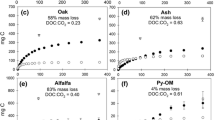Abstract
It has been long recognised that mineral elements, and nitrogen in particular, play an important role in determining the rate at which organic matter is decomposed. The magnitude and even the sign of the effects are, however, not universal and the underlying mechanisms are not well understood. In this paper, an explanation for the observed decreases in decomposition/CO2 evolution rates when inorganic nitrogen increases is proposed by combining a theoretical approach with the results of a 6-year litter decomposition-forest nitrogen fertilisation experiment. Our results show that the major causes of observed changes in decomposition rate after nitrogen fertilisation are increases in decomposer efficiency, more rapid formation of recalcitrant material, and, although less pronounced, decreased growth rate of decomposers. This gives a more precise description of how inorganic nitrogen modifies decomposition rates than the previously loosely used "decrease in microbial activity". The long-term consequences for soil carbon storage differ widely depending on which factor is changed; stores are much more sensitive to changes in decomposer efficiency and/or rate of formation of recalcitrant material than to changes in decomposer growth rate.
Similar content being viewed by others
Author information
Authors and Affiliations
Additional information
Electronic Publication
Rights and permissions
About this article
Cite this article
Ågren, G.I., Bosatta, E. & Magill, A.H. Combining theory and experiment to understand effects of inorganic nitrogen on litter decomposition. Oecologia 128, 94–98 (2001). https://doi.org/10.1007/s004420100646
Received:
Accepted:
Published:
Issue Date:
DOI: https://doi.org/10.1007/s004420100646




